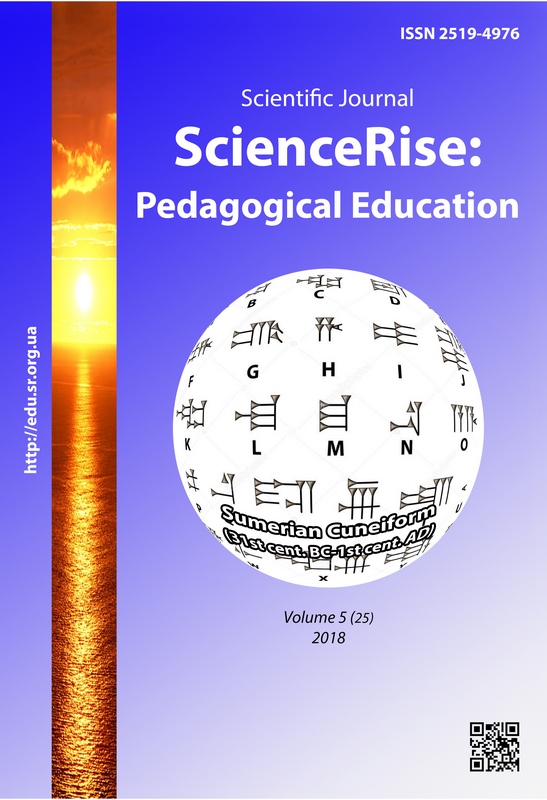Preparation of future higher school teachers to designing of professionally-oriented teaching technologies
DOI:
https://doi.org/10.15587/2519-4984.2018.136362Keywords:
teacher of higher education, professional-oriented technology, teaching technology, designing of educational technologiesAbstract
The article reveals the main components of the process of designing professionally-oriented learning technologies. Different approaches to the design of teaching technology through its stages are analyzed; consideration in the process of designing the features of the type of technology being designed; definition and further designing of a set of actions of the teacher within the limits of technologies, etc. Taking into account the tendencies of updating and modernizing the educational process, the conceptual framework for the training of future high school teachers to designing professionally-oriented technologies is based on an understanding of professionally oriented learning technology as a system of forms, methods, techniques and means aimed at guaranteeing the achievement of the objectives of professional training and bringing it as close as possible to the conditions of professional activity, ensuring the formation of a competitive labor market specialist. Designing professionally-oriented learning technologies takes place in accordance with the principles of system integrity; diagnostic, differentiated purposefulness; stimulating and motivating a positive attitude of students towards learning; flexible algorithm and variability of training; professional expediency; synergistic information support of training. System in the design process is provided by a combination of such components of professionally-oriented learning technology: targeted, informative, procedural-activity, diagnostic-corrective. The prevailing conditions for the use of professionally-oriented learning technologies are the creation of an appropriate educational environment for a higher education institution, where the introduction of the specified didactic system is in place, as well as the provision of a positive psycho-emotional climate in the process of professional training, systematic implementation of the subject of subjective interaction between students and teachers; active stimulation of students for self-education, self-training, self-development; an individualized choice of the type of professionally-oriented learning technology; application of innovative professional-oriented pedagogical tools for professional training
References
- Ohneviuk, V.; Kremen, V., Levovytskyi, T., Sysoieva, S. (Eds.) (2013). Reformuvannia – yak sutnisna kharakterystyka suchasnoi osvity [Reformation – as an essential characteristic of modern education]. Osvitni reformy: misiia, diisnist, refleksiia [Educational Reforms: mission, reality, reflection]. Kyiv: Edelveis, 61–106.
- Bespal'ko, V. P. (1989). Slagaemye pedagogicheskoi tehnologii [Components of pedagogical technology]. Moscow: Pedagogika, 192. Available at: https://www.twirpx.com/file/460333/ Last accessed: 25.06.2018
- Volkova, N. P. (2018). Interaktyvni tekhnologhii navchannia u vyshhii shkoli [Interactive technologies in higher education]. Dnepr: Universytet imeni Alfreda Nobelia, 360.
- Naboka, O. Gh. (2012). Profesiyno-orientovani tekhnologhii navchannia u fakhovii pidghotovci maibutnikh ekonomistiv: teoriia ta metodyka zastosuvannia [Professional-oriented technology of training in the professional training of future economists: theory and method of application]. Slovyansk: Pidpryemec Matorin B. I., 303.
- Andzheievska, A., Yankovych, O., Bednaryk, Yu. (2015). Osvitni tekhnolohii suchasnykh navchalnykh zakladiv [Educational technologies of modern educational institutions]. Ternopil: Ternopilskyi natsionalnyi pedahohichnyi universytet imeni Volodymyra Hnatiuka, 235.
- Naboka, O. Gh. (2012). Konceptualni aspekty zastosuvannia profesiino orientovanykh tekhnologhii u fakhovii pidghotovci maibutnikh ekonomistiv [Conceptual aspects of the application of professionally oriented technologies in the training of future economists]. Origins of pedagogical skill, 9, 148–153.
- Slastenin, V. A., Isaev, I. F., Shiianov, E. N.; Slastenin, V. A. (Eds.) (2013). Pedagogika [Pedagogy]. Moscow: Izdatel'skii centr «Akademiia», 576.
- Otych, O. M. (2014). Osnovy pedahohichnoi maisternosti vykladacha profesiinoi shkoly [Fundamentals of pedagogical skills of a teacher of a professional school]. Kirovohrad: Imeks-LTD, 208.
- Dziubenko, Yu. V., Oliinyk, L. V. (2007). Osoblyvosti tekhnolohichnoho pidkhodu do navchalnoho protsesu u vyshchii shkoli yak providnoho zasobu yoho optymizatsii [Features of technological approach to the educational process in high school as a leading means of its optimization]. Visnyk NTUU «KPI». Filosofiia. Psykholohiia. Pedahohika [Bulletin of the NTUU "KPI". Philosophy. Psychology. Pedagogy], 3 (21), 138–147. Available at: http://ela.kpi.ua/handle/123456789/11014 Last accessed: 25.06.2018
- Hutorskoi, A. V., Korol, A. D., Andrianova, G. A. (2011). Kompetencii uspeha v obrazovanii [Competencies of success in education]. Eydos [Eidos], 10. Available at: http://www.eidos.ru/journal/2011/1023-10.htm Last accessed: 25.06.2018
Downloads
Published
How to Cite
Issue
Section
License
Copyright (c) 2018 Olga Naboka

This work is licensed under a Creative Commons Attribution 4.0 International License.
Our journal abides by the Creative Commons CC BY copyright rights and permissions for open access journals.
Authors, who are published in this journal, agree to the following conditions:
1. The authors reserve the right to authorship of the work and pass the first publication right of this work to the journal under the terms of a Creative Commons CC BY, which allows others to freely distribute the published research with the obligatory reference to the authors of the original work and the first publication of the work in this journal.
2. The authors have the right to conclude separate supplement agreements that relate to non-exclusive work distribution in the form in which it has been published by the journal (for example, to upload the work to the online storage of the journal or publish it as part of a monograph), provided that the reference to the first publication of the work in this journal is included.








